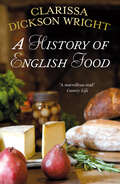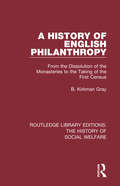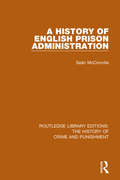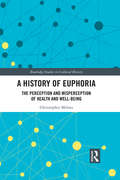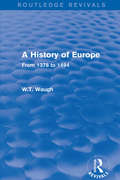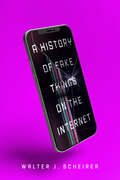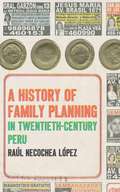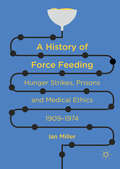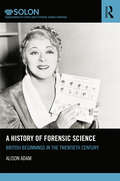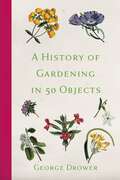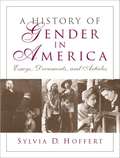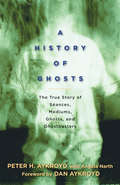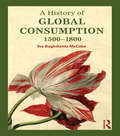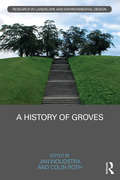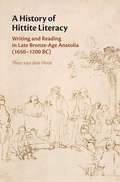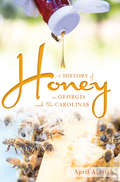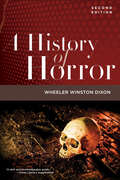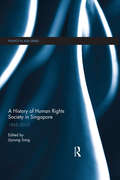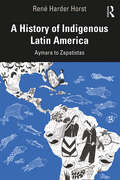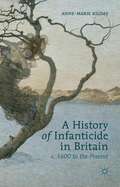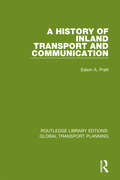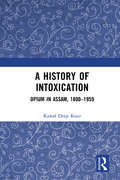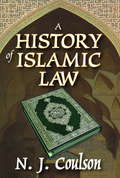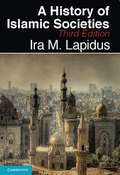- Table View
- List View
A History of English Field Names (Approaches to Local History)
by John FieldField names are not only interesting in themselves, but also a rich source of information about the communities originating them. The earliest recorded names often describe only the location or nature of the land, but changes in language, technology, social organisation, land ownership and even religious and political thinking have all contributed to a surprisingly complex picture today. A pioneering history.
A History of English Food
by Clarissa Dickson WrightIn this magnificent guide to England's cuisine, the inimitable Clarissa Dickson Wright takes us from a medieval feast to a modern-day farmers' market, visiting the Tudor working man's table and a Georgian kitchen along the way. Peppered with surprises and seasoned with wit, A History of England Food is a classic for any food lover.
A History of English Philanthropy: From the Dissolution of the Monasteries to the Taking of the First Census (Routledge Library Editions: The History of Social Welfare)
by B. Kirkman GrayFirst published in 1905, this book charts the history of English philanthropy from the Elizabethan period through to the nineteenth century. In doing so, Benjamin Kirkman Gray posed some important questions about modern philanthropy, and reflected on the meaning and worth of philanthropy. Through historical study, the author discussed this complex question, which, in a time before the development of the British welfare state, was particularly topical. This book will be of interest to those studying the history of philanthropy, social welfare and poverty.
A History of English Prison Administration (Routledge Library Editions: The History of Crime and Punishment #6)
by Sean McconvilleThis title, first published in 1981, draws from an extensive range of national and local material, and examines how innovations in policy and administration, while solving problems or setting new objectives, frequently created or disclosed fresh difficulties, and brought different types of people into the administration and management of prisons, whose interests, values and expectations in turn often had significant effects upon penal ideas and their practical applications. Special attention has been paid to the study of recruitment, the work and influence of gaolers, keepers, governors, and highly administrative officials. This comprehensive book will be of interest to students of criminology and history.
A History of Euphoria: The Perception and Misperception of Health and Well-Being (Routledge Studies in Cultural History #67)
by Christopher MilnesVery few people have not at some point in their lives believed themselves or their loved ones to be reasonably healthy when, in "reality", sickness was encroaching or never went away. Health has been deceiving us for thousands of years, but rarely have we entirely dispensed with it as a concept. This book sets out to establish why and how that might be. The first of its kind, this longue durée historical study explores some of the ways in which people in western societies and cultures have come to believe that they, or other people, have perceived or misperceived health, well-being and euphoria—a word which, before the twentieth century, usually named the experience of health. This book draws from a number of areas of historical research, including the histories of convalescence, addiction, madness and Sigmund Freud’s interest in Euphorie in his pre-psychoanalytical period.
A History of Europe: From 1378 to 1494
by W.T. WaughFirst published in 1932, this book looks at a period that has often been thought of as a time of general decline in the most characteristic features of medieval civilisation. While acknowledging decline in many areas during this period — the power of the Church, feudalism, guilds, the Hanseatic League, the autonomy of towns and the end of the two Roman empires — the author argues that there was also signs of development. National consciousness, the power of the bourgeoisie and trade and industry all rose markedly in this period alongside intellectual and artistic achievements outside of Italy. This book asserts that in amongst the failure and decline new forces were creating new substitutes.
A History of Fake Things on the Internet
by Walter ScheirerA Next Big Idea Club "Must Read" for December 2023 As all aspects of our social and informational lives increasingly migrate online, the line between what is "real" and what is digitally fabricated grows ever thinner—and that fake content has undeniable real-world consequences. A History of Fake Things on the Internet takes the long view of how advances in technology brought us to the point where faked texts, images, and video content are nearly indistinguishable from what is authentic or true. Computer scientist Walter J. Scheirer takes a deep dive into the origins of fake news, conspiracy theories, reports of the paranormal, and other deviations from reality that have become part of mainstream culture, from image manipulation in the nineteenth-century darkroom to the literary stylings of large language models like ChatGPT. Scheirer investigates the origins of Internet fakes, from early hoaxes that traversed the globe via Bulletin Board Systems (BBSs), USENET, and a new messaging technology called email, to today's hyperrealistic, AI-generated Deepfakes. An expert in machine learning and recognition, Scheirer breaks down the technical advances that made new developments in digital deception possible, and shares behind-the-screens details of early Internet-era pranks that have become touchstones of hacker lore. His story introduces us to the visionaries and mischief-makers who first deployed digital fakery and continue to influence how digital manipulation works—and doesn't—today: computer hackers, digital artists, media forensics specialists, and AI researchers. Ultimately, Scheirer argues that problems associated with fake content are not intrinsic properties of the content itself, but rather stem from human behavior, demonstrating our capacity for both creativity and destruction.
A History of Family Planning in Twentieth-Century Peru
by Raúl Necochea LópezAdding to the burgeoning study of medicine and science in Latin America, this important book offers a comprehensive historical perspective on the highly contentious issues of sexual and reproductive health in an important Andean nation. Raul Necochea Lopez approaches family planning as a historical phenomenon layered with medical, social, economic, and moral implications. At stake in this complex mix were new notions of individual autonomy, the future of gender relations, and national prosperity.The implementation of Peru's first family planning programs led to a rapid professionalization of fertility control. Complicating the evolution of associated medical services were the conflicting agendas of ordinary citizens, power brokers from governmental and military sectors, clergy, and international health groups. While family planning promised a greater degree of control over individuals' intimate lives, as well as opportunities for economic improvement through the effective management of birth rates, the success of attempts to regulate fertility was far from assured. Today, Necochea Lopez observes, although the quality of family planning resources in Peru has improved, services remain far from equitably available.
A History of Force Feeding: Hunger Strikes, Prisons and Medical Ethics, 1909–1974
by Ian MillerThis book is Open Access under a CC BY license. It is the first monograph-length study of the force-feeding of hunger strikers in English, Irish and Northern Irish prisons. It examines ethical debates that arose throughout the twentieth century when governments authorised the force-feeding of imprisoned suffragettes, Irish republicans and convict prisoners. It also explores the fraught role of prison doctors called upon to perform the procedure. Since the Home Office first authorised force-feeding in 1909, a number of questions have been raised about the procedure. Is force-feeding safe? Can it kill? Are doctors who feed prisoners against their will abandoning the medical ethical norms of their profession? And do state bodies use prison doctors to help tackle political dissidence at times of political crisis?
A History of Forensic Science: British beginnings in the twentieth century (Routledge SOLON Explorations in Crime and Criminal Justice Histories)
by Alison AdamHow and when did forensic science originate in the UK? This question demands our attention because our understanding of present-day forensic science is vastly enriched through gaining an appreciation of what went before. A History of Forensic Science is the first book to consider the wide spectrum of influences which went into creating the discipline in Britain in the first part of the twentieth century. This book offers a history of the development of forensic sciences, centred on the UK, but with consideration of continental and colonial influences, from around 1880 to approximately 1940. This period was central to the formation of a separate discipline of forensic science with a distinct professional identity and this book charts the strategies of the new forensic scientists to gain an authoritative voice in the courtroom and to forge a professional identity in the space between forensic medicine, scientific policing, and independent expert witnessing. In so doing, it improves our understanding of how forensic science developed as it did. This book is essential reading for academics and students engaged in the study of criminology, the history of forensic science, science and technology studies and the history of policing.
A History of Gardening in 50 Objects
by George DrowerThe earliest record of an enclosed space around a homestead come from 10,000 BC and since then gardens of varying types and ambition have been popular throughout the ages. Whether ornamental patches surrounding wild cottages, container gardens blooming over unforgiving concrete or those turned over for growing produce, gardens exist in all shapes and sizes, in all manner of styles.Today we benefit from centuries of development, be it in the cultivation of desirable blossom or larger fruits, in the technology to keep weeds and lawn at bay or even in the visionaries who tore up rulebooks and cultivated pure creativity in their green spaces.George Drower takes fifty objects that have helped create the gardening scene we know today and explores the history outside spaces in a truly unique fashion. With stunning botanical and archive images, this lavish volume is essential for garden lovers.
A History of Gender in America: Essays, Documents, and Articles
by Sylvia D. HoffertA reader for an undergraduate course assembling recent literature on the history of gender in the US, with section introductions setting the context of the period covered. A list of suggested readings replaces a bibliography. There is no index. Annotation c. Book News, Inc., Portland, OR (booknews.com)
A History of Ghosts: The True Story of Séances, Mediums, Ghosts, and Ghostbusters
by Peter H. Aykroyd Angela NarthPeter Aykroyd spent his childhood watching his family's parlor séances through the crack of a basement door. Here, for the first time, Aykroyd tells the strange and delightful story that inspired his son, Dan, to make the mega-hit, Ghostbusters. Part history, part family legend, A History of Ghosts starts in 1848 in upstate New York, where the spiritualist craze first began. Aykroyd introduces the reader to notable mediums while telling the story of the development of spiritualism, interweaving a personal history marked by a fascination with ghosts and spirits with the larger narrative about the role the paranormal has played in our culture. Such legendary figures as Sir Arthur Conan Doyle and Harry Houdini appear and vanish. Everyone loves a good ghost story. Successful TV shows such as Medium and Ghost Hunters are proof that our national obsession with ghosts is here to stay. Millions of Americans believe in the paranormal—and even skeptics have heard a bump in the night and suspected it might be something supernatural.
A History of Global Consumption: 1500 - 1800
by Ina Baghdiantz McCabeIn A History of Global Consumption: 1500 – 1800, Ina Baghdiantz McCabe examines the history of consumption throughout the early modern period using a combination of chronological and thematic discussion, taking a comprehensive and wide-reaching view of a subject that has long been on the historical agenda. The title explores the topic from the rise of the collector in Renaissance Europe to the birth of consumption as a political tool in the eighteenth century. Beginning with an overview of the history of consumption and the major theorists, such as Bourdieu, Elias and Barthes, who have shaped its development as a field, Baghdiantz McCabe approaches the subject through a clear chronological framework. Supplemented by illlustrations in every chapter and ranging in scope from an analysis of the success of American commodities such as tobacco, sugar and chocolate in Europe and Asia to a discussion of the Dutch tulip mania, A History of Global Consumption: 1500 – 1800 is the perfect guide for all students interested in the social, cultural and economic history of the early modern period.
A History of Groves (Routledge Research in Landscape and Environmental Design)
by Jan Woudstra Colin RothThe grove, a grouping of trees, intentionally cultivated or found growing wild, has a long diverse history entwined with human settlement, rural practices and the culture and politics of cities. A grove can be a memorial, a place of learning, a site of poetic retreat and philosophy or political encampment, a public park or theatre, a place of hidden pleasures, a symbol of a vanished forest ecology, or a place of gods or other spirits. Yet groves are largely absent from our contemporary vocabulary and rarely included in today’s landscape practice, whether urban or rural. Groves are both literal and metaphorical manifestations, ways of defining spaces and ecologies in our cultural life. Since they can add meaning to urban forms and ecologies and contribute meaningfully to the significance of place, critical examination is long overdue. The editors have taken care to ensure that the text is accessible to the general reader as well as specialists.
A History of Hittite Literacy: Writing and Reading in Late Bronze-Age Anatolia (1650–1200 BC)
by Theo van HoutWhy did the Anatolians remain illiterate for so long, although surrounded by people using script? Why and how did they eventually adopt the cuneiform writing system and why did they still invent a second, hieroglyphic script of their own? What did and didn't they write down and what role did Hittite literature, the oldest known literature in any Indo-European language, play? These and many other questions on scribal culture are addressed in this first, comprehensive book on writing, reading, script usage, and literacy in the Hittite kingdom (c.1650–1200 BC). It describes the rise and fall of literacy and literature in Hittite Anatolia in the wider context of its political, economic, and intellectual history.
A History of Honey in Georgia and the Carolinas (American Palate)
by April AldrichIn the late 1800s, Georgia and the Carolinas produced millions of pounds of honey and created a lasting legacy within the industry. The uses for the sweet nectar go well beyond flavor. Bee pollination extensively benefits agricultural crops in the area. Elements from the beehive are commonly used in popular cosmetics, medicines and mead. Beekeepers also face serious challenges like Colony Collapse Disorder. Join author and beekeeper April Aldrich as she traces the delectable history of honey and beekeeping throughout the region, from ancient apiaries to modern meaderies and beyond.
A History of Horror, 2nd Edition
by Wheeler Winston DixonEver since horror leapt from popular fiction to the silver screen in the late 1890s, viewers have experienced fear and pleasure in exquisite combination. Wheeler Winston Dixon's fully revised and updated A History of Horror is still the only book to offer a comprehensive survey of this ever-popular film genre. Arranged by decades, with outliers and franchise films overlapping some years, this one-stop sourcebook unearths the historical origins of characters such as Dracula, Frankenstein, and the Wolfman and their various incarnations in film from the silent era to comedic sequels. In covering the last decade, this new edition includes coverage of the resurgence of the genre, covering the swath of new groundbreaking horror films directed by women, Black and queer horror films, and a new international wave in body horror films. A History of Horror explores how the horror film fits into the Hollywood studio system, how the distribution and exhibition of horror films have changed in a post-COVID world, and how its enormous success in American and European culture expanded globally over time. Dixon examines key periods in the horror film-in which the basic precepts of the genre were established, then banished into conveniently reliable and malleable forms, and then, after collapsing into parody, rose again and again to create new levels of intensity and menace. A History of Horror, supported by rare stills from classic films, brings over sixty timeless horror films into frightfully clear focus, zooms in on today's top horror Web sites, and champions the stars, directors, and subgenres that make the horror film so exciting and popular with contemporary audiences.
A History of Human Rights Society in Singapore: 1965-2015 (Politics in Asia)
by Jiyoung SongTo celebrate Singapore’s fiftieth anniversary for its independence from Malaysia in 2015, 35 students, academics and activists came together to discuss and write about pioneering Singaporean human rights activists and their under-reported stories in Singapore. The city-state is known for its remarkable economic success while having strict laws on individual freedom in the name of national security, public order and racial harmony. Singapore’s tough stance on human rights, however, does not negate the long and persistent existence of a human rights society that is little known to the world until today. This volume, composed of nine distinctive chapters, records a history of human rights activists, their campaigns, main contentions with the government, survival strategies and other untold stories in Singapore’s first 50 years of state-building.
A History of Indigenous Latin America: Aymara to Zapatistas
by René Harder HorstA History of Indigenous Latin America is a comprehensive introduction to the people who first settled in Latin America, from before the arrival of the Europeans to the present. Indigenous history provides a singular perspective to political, social and economic changes that followed European settlement and the African slave trade in Latin America. Set broadly within a postcolonial theoretical framework and enhanced by anthropology, economics, sociology, and religion, this textbook includes military conflicts and nonviolent resistance, transculturation, labor, political organization, gender, and broad selective accommodation. Uniquely organized into periods of 50 years to facilitate classroom use, it allows students to ground important indigenous historical events and cultural changes within the timeframe of a typical university semester. Supported by images, textboxes, and linked documents in each chapter that aid learning and provide a new perspective that broadly enhances Latin American history and studies, it is the perfect introductory textbook for students.
A History of Infanticide in Britain, c. 1600 to the Present
by Anne-Marie KildayThe killing of new-born children is an intensely emotional and emotive subject. The hidden nature of this crime has made it an area incredibly difficult subject area for historians to approach up until now. This work provides the first detailed history of infanticide in mainland Britain from 1600 to the modern era.
A History of Inland Transport and Communication (Routledge Library Edtions: Global Transport Planning #16)
by Edwin A. PrattOriginally published in 1912, this book with extensive source footnotes and bibliography follows the evolution and development of roads, rivers, canals, tramways, buses and cycles. The role that the development of transport played in the growth and expansion of trade and industry and on the general economic and social conditions of the country is one of the main issues that is discussed. Other themes which are examined are the electrification of the railways, railways and the state, railway rates and charges and early trading conditions.
A History of Intoxication: Opium in Assam, 1800–1959
by Kawal Deep KourThis volume unearths the emerging pattern of consumption of opium in colonial Assam and the creation of drug-dependency in a social context. It analyses the competing forces of the empire which played a key role in the production and distribution of opium; national politics alongside international drug diplomacy and how these together shaped the discourse of opium in Assam; the wider implications of opium production and consumption in the agrarian economy and the narrative of the nationalist critique of intoxication. Please note: Taylor & Francis does not sell or distribute the Hardback in India, Pakistan, Nepal, Bhutan, Bangladesh and Sri Lanka.
A History of Islamic Law (Islamic Surveys Ser.)
by N. CoulsonLawyers, according to Edmund Burke, are bad historians. He was referring to an unwillingness, rather than an inaptitude, on the part of early nineteenth-century English lawyers to concern themselves with the past: for contemporary jurisprudence was a pure and isolated science wherein law appeared as a body of rules, based upon objective criteria, whose nature and very existence were independent of considerations of time and place. Despite the influence of the historical school of Western jurisprudence, Burke's observation is generally valid for Middle East studies. Muslim jurisprudence in its traditional form provides an extreme example of a legal science divorced from historical considerations. Law, in classical Islamic theory, is the revealed will of God, a divinely ordained system preceding, and not preceded by, the Muslim state controlling, but not controlled by, Muslim society. There can thus be no relativistic notion of the law itself evolving as an historical phenomenon closely tied with the progress of society. The increasing number of nations that are largely Muslim or have a Muslim head of state, emphasizes the growing political importance of the Islamic world, and, as a result, the desirability of extending and expanding the understanding and appreciation of their culture and belief systems. Since history counts for much among Muslims and what happened in 632 or 656 is still a live issue, a journalistic familiarity with present conditions is not enough; there must also be some awareness of how the past has molded the present. This book is designed to give the reader a clear picture. But where there are gaps, obscurities, and differences of opinion, these are also indicated.
A History of Islamic Societies
by Ira LapidusThis new edition of one of the most widely used course books on Islamic civilizations around the world has been substantially revised to incorporate the new scholarship and insights of the last twenty-five years. Ira Lapidus' history explores the beginnings and transformations of Islamic civilizations in the Middle East and details Islam's worldwide diffusion. The history is divided into four parts. Part I is a comprehensive account of pre-Islamic late antiquity; the beginnings of Islam; the early Islamic empires; and Islamic religious, artistic, legal and intellectual cultures. Part II deals with the construction in the Middle East of Islamic religious communities and states to the fifteenth century. Part III includes the history to the nineteenth century of Islamic North Africa and Spain; the Ottoman, Safavid and Mughal empires; and other Islamic societies in Asia and Africa. Part IV accounts for the impact of European commercial and imperial domination on Islamic societies and traces the development of the modern national state system and the simultaneous Islamic revival from the early nineteenth century to the present.

